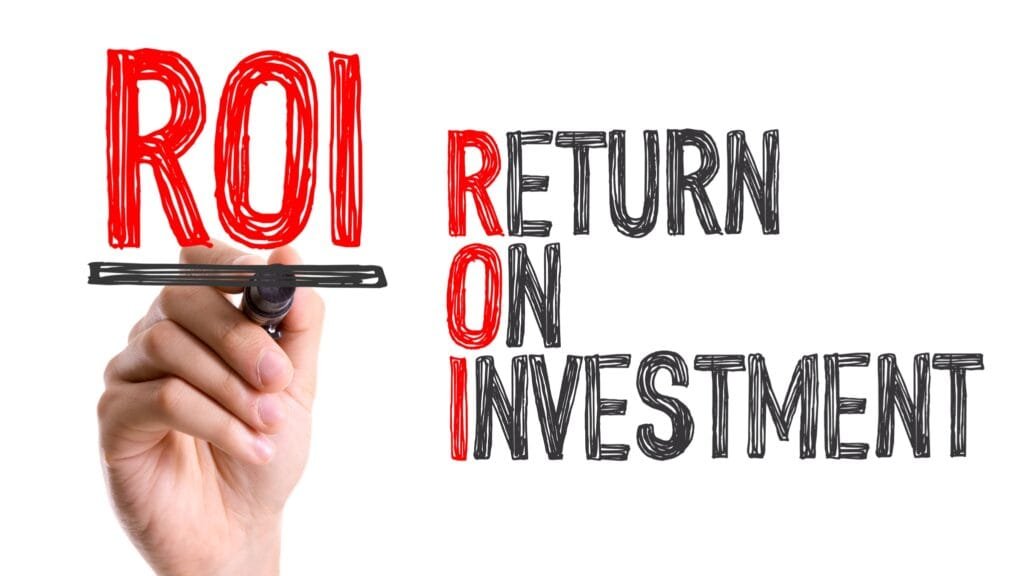Are you tired of feeling like your real estate investments are not generating the returns you expected?
With the right strategies, you can boost your Real Estate ROI and achieve your financial goals.
In this post, we’ll explore the importance of understanding your Real Estate ROI and provide proven tips to help you maximize your returns.

Understanding Real Estate ROI
Real Estate Return on Investment (ROI) is a vital metric for property investors, as it helps them assess the profitability of their investments. By understanding the ROI of a property, investors can make informed decisions about which properties to buy, sell, or hold. In this post, we’ll delve into the world of Real Estate ROI, exploring what it means, why it’s important, and how to calculate it.
Calculating your Real Estate ROI can have numerous benefits for property investors, including identifying profitable investment opportunities, optimizing portfolio performance, and making data-driven decisions. By regularly monitoring your ROI, you can stay ahead of the competition and make informed decisions about your investment strategy.
Despite its importance, achieving a high Real Estate ROI can be challenging for property investors. Common obstacles include inadequate cash flow, high operating expenses, and market fluctuations. To overcome these challenges, investors must carefully assess their financial situation, optimize their operations, and develop a robust investment strategy.
To boost your Real Estate ROI, investors can employ various strategies, including renovations, repositioning, and re-leasing. These strategies can increase property value, reduce operating expenses, and enhance cash flow. By combining these strategies with a solid investment plan, property investors can achieve higher returns and improve their overall performance.
Conducting thorough market research is crucial for property investors seeking to maximize their Real Estate ROI. By analyzing market trends, identifying opportunities, and understanding local regulations, investors can make informed decisions about their investment strategy and optimize their returns.
Best Long-Term Real Estate Investments for Beginners
For beginners, starting with long-term investments can be a wise choice. Residential properties tend to appreciate over time, offering stability. Single-family homes and multi-family units in growing areas are great options for new investors. They often provide consistent returns and are less volatile than other investment types.
Additionally, beginners should focus on properties in neighborhoods with clear signs of future growth. Look for areas where infrastructure projects or businesses are expanding. These areas often experience a rise in property values over time, creating opportunities for long-term returns.
Investing in undervalued properties is another excellent strategy. Properties in need of some renovation can be bought at lower prices, then improved for a higher resale or rental value. This can maximize returns, particularly when done in high-demand markets.
Finally, the key to success in long-term investments is patience. Real estate investments take time to appreciate, and consistent rental income can build wealth steadily. It’s essential to research local markets, understand trends, and choose properties with strong potential for growth.

How to Maximize ROI on Rental Property
Maximizing ROI on rental properties involves more than just finding the right property—it requires effective property management. Start by choosing properties in high-demand areas where rental prices are likely to increase. High-quality properties in prime locations can ensure a steady stream of tenants and rental income.
Investors should also focus on reducing operational costs. By maintaining the property properly and finding efficient service providers, you can minimize expenses while maintaining quality. Simple upgrades, such as energy-efficient appliances, can help reduce long-term costs and improve tenant satisfaction.
Rent increases are another powerful way to boost ROI. Be sure to stay aware of local rental market trends. When rents increase, make adjustments to your pricing accordingly. However, it’s crucial to stay competitive and avoid overpricing, which could lead to vacancies.
Moreover, property management is crucial. Effective management means fewer vacancies, lower turnover rates, and tenants who stay longer. High tenant satisfaction translates into consistent cash flow and reduces the risk of lost income.

The Benefits of Calculating Your ROI
Calculating your Real Estate ROI brings numerous benefits, including identifying profitable investment opportunities, optimizing portfolio performance, and making data-driven decisions. By regularly monitoring your ROI, you can stay ahead of the competition and make informed decisions about your investment strategy. Moreover, calculating your ROI helps you to understand the financial performance of your investment, allowing you to make adjustments and optimize your returns.
Achieving a high Real Estate ROI can be challenging due to various obstacles, including inadequate cash flow, high operating expenses, and market fluctuations. Additionally, unexpected events such as natural disasters or economic downturns can also impact your ROI. To overcome these challenges, it is essential to have a robust investment strategy and be prepared for any unexpected events.
To boost your Real Estate ROI, you can employ various strategies, including renovations, repositioning, and re-leasing. These strategies can increase property value, reduce operating expenses, and enhance cash flow. Moreover, conducting thorough market research and staying up-to-date with market trends can also help you make informed decisions and maximize your returns.
Real Estate Return on Investment (ROI) is a crucial metric for property investors, as it helps them assess the profitability of their investments. By understanding the ROI of a property, investors can make informed decisions about which properties to buy, sell, or hold. Moreover, calculating your ROI helps you to understand the financial performance of your investment, allowing you to make adjustments and optimize your returns.
Conducting thorough market research is essential for property investors seeking to maximize their Real Estate ROI. By analyzing market trends, identifying opportunities, and understanding local regulations, investors can make informed decisions about their investment strategy and optimize their returns. Moreover, staying up-to-date with market trends and being prepared for any changes can help you adapt and make adjustments to your investment strategy.
Common Challenges in Achieving High ROI
One of the primary challenges in achieving a high Real Estate ROI is inadequate cash flow. This can be due to various factors, including unexpected expenses, slow rental income, or high property management costs. Additionally, high operating expenses, such as property taxes, insurance, and maintenance, can also eat into your profits. Furthermore, market fluctuations, including changes in property values or rental income, can also impact your ROI. To overcome these challenges, it’s essential to have a solid financial plan in place and be prepared for any unexpected events.
Calculating your Real Estate ROI brings numerous benefits, including identifying profitable investment opportunities, optimizing portfolio performance, and making data-driven decisions. By regularly monitoring your ROI, you can stay ahead of the competition and make informed decisions about your investment strategy. Moreover, calculating your ROI helps you to understand the financial performance of your investment, allowing you to make adjustments and optimize your returns.
To boost your Real Estate ROI, you can employ various strategies, including renovations, repositioning, and re-leasing. These strategies can increase property value, reduce operating expenses, and enhance cash flow. Moreover, conducting thorough market research and staying up-to-date with market trends can also help you make informed decisions and maximize your returns.
Real Estate Return on Investment (ROI) is a crucial metric for property investors, as it helps them assess the profitability of their investments. By understanding the ROI of a property, investors can make informed decisions about which properties to buy, sell, or hold. Moreover, calculating your ROI helps you to understand the financial performance of your investment, allowing you to make adjustments and optimize your returns.
Conducting thorough market research is essential for property investors seeking to maximize their Real Estate ROI. By analyzing market trends, identifying opportunities, and understanding local regulations, investors can make informed decisions about their investment strategy and optimize their returns. Moreover, staying up-to-date with market trends and being prepared for any changes can help you adapt and make adjustments to your investment strategy.
Tips for Investing in Commercial Real Estate
Commercial real estate is a great way to maximize ROI, but it comes with its own set of challenges. One of the most important strategies is investing in properties located in growing business districts. These areas are likely to attract high-quality tenants who pay premium rents.
Diversification is key in commercial real estate. By investing in different types of properties, such as office spaces, retail locations, and industrial properties, you can balance risks and returns. Different sectors tend to perform better at different times, so having a mix helps smooth out market fluctuations.
Tenant retention is another important factor in maximizing commercial real estate ROI. Properties with long-term, reliable tenants provide more stable income streams. Look for properties with strong lease agreements, and keep tenants satisfied to ensure they stay longer.
Commercial properties also benefit from more significant depreciation deductions, which can reduce tax liability and enhance overall returns. Be sure to take full advantage of these deductions while adhering to tax laws
Proven Strategies to Boost Your ROI
To boost your Real Estate ROI, property investors can employ various strategies, including renovations, repositioning, and re-leasing. Renovations can increase property value by improving aesthetics, functionality, and energy efficiency.
Repositioning involves rebranding or repositioning the property to appeal to a different demographic or market.
Re-leasing involves finding new tenants or extending existing leases to maximize occupancy and income. Additionally, investors can also conduct thorough market research and stay up-to-date with market trends to make informed decisions and maximize their returns.

Top Real Estate Markets for High ROI in 2025
Identifying the best markets for real estate investment is key to achieving high ROI. In 2025, cities like Austin, Texas, are expected to see massive growth, driven by a thriving tech industry and a growing population. These types of cities offer both price appreciation and steady rental income.
Other cities, such as Raleigh, North Carolina, have a lower cost of living and are attracting new businesses, making them great targets for real estate investments. Areas with low housing inventory but rising demand present unique opportunities for capital appreciation.
Cities like Phoenix, Arizona, and Boise, Idaho, also show strong potential for growth. Both cities benefit from a robust job market and an influx of residents from more expensive areas, increasing demand for housing.
However, always ensure you’re considering future growth trends. Research the local economy, job market, and housing inventory to determine whether a city’s real estate market is likely to outperform others.
Real Estate Crowdfunding Platforms for Passive Income
Real estate crowdfunding platforms provide an innovative way to earn passive income. These platforms pool funds from many investors to invest in larger commercial or residential properties. The benefit is that you can earn a share of the income without the hassle of property management.
Crowdfunding offers a low-barrier entry point into high-value real estate projects. With just a small investment, you can gain exposure to a wide variety of property types, from apartment buildings to office spaces. This allows you to diversify your investment portfolio while reducing risk.
However, it’s essential to choose reputable platforms. Research the projects and their past performance before investing. Some platforms offer opportunities in both debt-based and equity-based investments, providing different levels of risk and return.
Real estate crowdfunding can also provide regular dividend payouts or appreciation-based returns. Over time, this can create a steady stream of passive income that doesn’t require hands-on involvement.
The Importance of Market Research
Conducting thorough market research is essential for property investors seeking to maximize their Real Estate ROI. By analyzing market trends, identifying opportunities, and understanding local regulations, investors can make informed decisions about their investment strategy and optimize their returns.
Moreover, staying up-to-date with market trends and being prepared for any changes can help you adapt and make adjustments to your investment strategy. For example, analyzing demographic data can help you identify areas with high demand for certain types of properties, such as apartments or single-family homes.
Additionally, researching local regulations can help you identify potential issues or opportunities, such as zoning changes or tax incentives.
How to Find Undervalued Real Estate Properties in a Hot Market
Finding undervalued properties in a hot market requires a sharp eye and strategic thinking. One tactic is to target properties that have been sitting on the market longer than expected. Sellers who are eager to close may be more willing to negotiate on price, even in a competitive market.
Another strategy is to focus on up-and-coming neighborhoods. These areas may not yet reflect the full demand but often have strong potential for future appreciation. Research neighborhood trends, look for new businesses, and identify local development projects that could increase property values.
Work with local real estate agents who have in-depth knowledge of the area. They can provide insights into which properties are undervalued or may soon rise in value. Building strong local connections can help you find opportunities before they are widely known.
Don’t forget to consider property condition. Sometimes, properties that need minor repairs or renovations can be purchased below market value. After making improvements, these properties can be flipped for a profit or rented out for higher income.
Tax Benefits of Investing in Rental Properties for First-Time Buyers
First-time buyers can take advantage of several tax benefits when investing in rental properties. One of the most significant advantages is the ability to deduct mortgage interest, property management costs, and repair expenses. These deductions can reduce your taxable income, boosting your ROI.
Additionally, rental properties are eligible for depreciation, which allows you to spread the cost of the property over a period of years. This reduces your taxable income each year, providing substantial savings.
First-time buyers can also deduct costs related to property upgrades, maintenance, and insurance. These deductions are crucial for lowering operating costs, which in turn increases net income and ROI.
Lastly, understanding tax laws related to rental properties is vital. By working with a tax professional, you can ensure you’re maximizing all available deductions and taking full advantage of the tax benefits associated with real estate investments.
Conclusion: Unlocking Your Real Estate ROI Potential
By understanding the importance of market research, calculating your ROI, and employing proven strategies to boost your ROI, you can unlock your Real Estate ROI potential.
Additionally, staying up-to-date with market trends and being prepared for any changes can help you adapt and make adjustments to your investment strategy.
With the right approach, you can maximize your returns and achieve your financial goals.
Remember to always keep your investment strategy flexible and be open to new opportunities and challenges.
By doing so, you can ensure a successful and profitable investment in the Real Estate market.
FAQ – Frequently Asked Questions about Real Estate ROI
What is Real Estate ROI and why is it important?
Real Estate Return on Investment (ROI) is a crucial metric for property investors, as it helps them assess the profitability of their investments. By understanding the ROI of a property, investors can make informed decisions about which properties to buy, sell, or hold.
How can I calculate my Real Estate ROI?
Calculating your Real Estate ROI involves analyzing the income and expenses of your property, including rental income, property taxes, insurance, and maintenance. You can use a Real Estate ROI calculator or consult with a financial advisor to help you calculate your ROI.
What are some common challenges in achieving high Real Estate ROI?
Common challenges in achieving high Real Estate ROI include inadequate cash flow, high operating expenses, and market fluctuations. To overcome these challenges, it’s essential to have a solid financial plan in place and be prepared for any unexpected events.
How can I boost my Real Estate ROI?
To boost your Real Estate ROI, property investors can employ various strategies, including renovations, repositioning, and re-leasing. Renovations can increase property value by improving aesthetics, functionality, and energy efficiency. Repositioning involves rebranding or repositioning the property to appeal to a different demographic or market. Re-leasing involves finding new tenants or extending existing leases to maximize occupancy and income.
Why is market research important for Real Estate ROI?
Conducting thorough market research is essential for property investors seeking to maximize their Real Estate ROI. By analyzing market trends, identifying opportunities, and understanding local regulations, investors can make informed decisions about their investment strategy and optimize their returns.
What are some best practices for Real Estate ROI optimization?
Best practices for Real Estate ROI optimization include conducting regular market research, analyzing financial data, and making data-driven decisions. It’s also essential to stay up-to-date with market trends and be prepared for any changes in the market.
Source: NYT Finance | Related articles: Linkedin / X- Twitter




